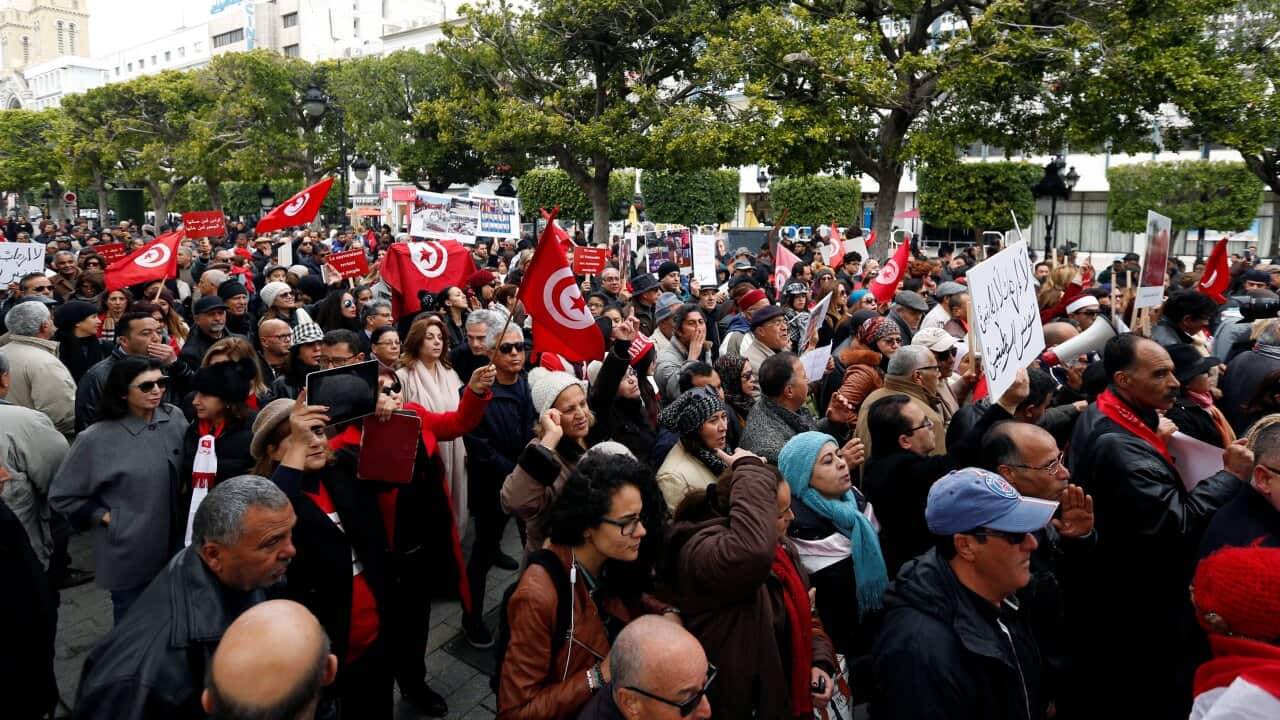Thousands of youths have been recruited by terrorist groups from Africa, the Middle East, Europe, Asia and America. Between 2011 and 2016 rose to more than 42,000 – among them and close to . They had travelled to the Middle East to join jihadist organisations such as the so-called “Islamic State” (IS) and the Syrian Fateh al-Sham Front (ex-Al-Nusra), a former al Qaeda affiliate.
By early 2016, almost a third of these foreign fighters had returned to their . Now that IS is suffering serious military setbacks, the flow of foreign fighters seems to have dwindled. More returnees can be expected to follow in the near future.
In North Africa, hundreds of men and women who joined IS or Fateh al-Sham Front have returned home with combat experience. They pose a major security threat to the region. At least Tunisians have, so far, returned to the country. Authorities are concerned they could be coordinating new attacks with terrorist networks.
These fears are not without foundation. Terrorist groups like IS continue to encourage those within Europe and Africa (whether returnees or supporters) .
So how should governments manage these returnees? It’s not an easy question to answer but of provide some insights. What’s clear is that there are many facets of radicalised youth – and that there’s no single solution to eradicate this social evil.
What the available evidence suggests is that governments must respond realistically to a complex problem. And they need to accept that opting for the reintegration of (former) terrorists to minimise the possibilities of future violence is not adopting a soft approach. Realistically, it’s the only approach.
Refugees and migrants are not terrorists
The fear of further attacks has driven the media to draw a link between anti-terror measures and immigration policy that is “analytically and statistically unfounded, and must change”, , the UN’s Special Rapporteur on counter-terrorism and human rights.
The report recommends that countries should realise the vast majority of Syrian refugees and others are victims of terrorism. They must not be regarded as potential suspects. It also calls on states to respect migrants’ fundamental rights and warns that attempts to snub asylum seekers or detain migrants are a violation of human rights and international refugee law. Emmerson warned that operations to stop migration may also increase .
This suggests the vital need for strategies that address issues of migration and refugees, and the risks that returning foreign fighters may pose.
Unlike refugees or migrants, foreign fighters returning from the conflict in Syria and Iraq are a serious security threat at home and internationally. While in the war zone, they joined terrorist networks, adopted techniques like suicide bombings and beheadings, and set up ties with other jihadists around the globe.
Different countries have different mitigating factors that limit the danger. The presence of tough and focused security services is particularly important. Several countries in Africa and Europe have developed an individual risk management and analysis for returnees. These people are categorised according to the duration they spent in the war zone, what they did there and their goal after their return.
Criminal trials are favoured in most European and African countries for dealing with returnees. But trials don’t usually result in convictions; evidence against the returnees is often lacking.
This shows the critical need for a comprehensive approach that gets local authorities and social partners involved. These could include, for example, Child Protection Services, Social Services and the health sector.
Strategies to combat the risks
North African nations must decide how to handle returnees.
Tunisia has around . The country has . Morocco had an estimated citizens fighting in Syria and Iraq as of October 2015. Some returnees have been jailed, but the country still needs to develop an effective strategy to deal with others.
Some decision makers seem to feel that returnees will always be terrorists who present a permanent threat to national security. But a dialogue is necessary with the returnees. They must be retrained and reintegrated into their own societies.
To make reintergration feasible, the government must take an all-inclusive approach. This would entail including returnees’ families, neighbourhoods and local communities in the process. It also requires partnership with government, schools, universities, civil society organisations, and the private sector.
Deradicalisation and reintegration
The deradicalisation of (former) terrorists or extremists can be viewed as a process geared at ensuring their reintegration into society in a way that minimises the chances they will resort to terrorism-related activity.
Reintegration plans must therefore be flexible and tailored to an individual’s specific background and motives.
The deradicalisation programme, which combines education with anti-violence training, is an attempt to disentangle the individual’s sense of hatred from his or her political vision of the world and address both the motives behind their hate sentiments. It also aims to reintroduce them to democratic values and peaceful ways of expressing their feelings and viewpoints.
Numerous are already underway in Tunisia, Morocco, and many European countries. Most cover a range of activities such as religious and psychological counselling, vocational skills training, education and recreation.
Reintegration programmes should include both deradicalisation and disengagement-based efforts. Deradicalisation, which emphasises erasing violent ideologies from extremists’ minds, is very crucial. But it should be considered one of many possible options through which to limit the possibilities of recidivism.
In this context information sharing, as well as social media monitoring relevant to conflict zones, is of paramount importance.
More research initiatives should be carried out in close cooperation with policy makers and experts. This will enable the successful reintegration of terrorists and extremists in society.
Finally, there is a need for an optimistic environment to send a clear message of hope to migrants, refugees, youth and communities. Governments should continue building relations with them, gaining their trust – and deriving intelligence.









